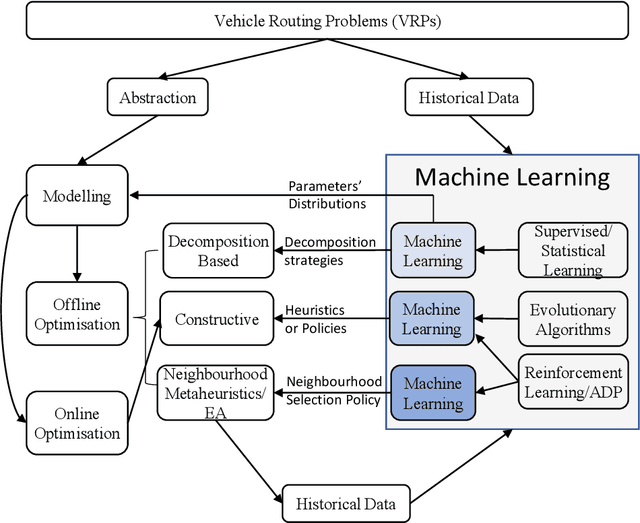Xiaoping Jiang
Analytics and Machine Learning in Vehicle Routing Research
Feb 19, 2021
Abstract:The Vehicle Routing Problem (VRP) is one of the most intensively studied combinatorial optimisation problems for which numerous models and algorithms have been proposed. To tackle the complexities, uncertainties and dynamics involved in real-world VRP applications, Machine Learning (ML) methods have been used in combination with analytical approaches to enhance problem formulations and algorithmic performance across different problem solving scenarios. However, the relevant papers are scattered in several traditional research fields with very different, sometimes confusing, terminologies. This paper presents a first, comprehensive review of hybrid methods that combine analytical techniques with ML tools in addressing VRP problems. Specifically, we review the emerging research streams on ML-assisted VRP modelling and ML-assisted VRP optimisation. We conclude that ML can be beneficial in enhancing VRP modelling, and improving the performance of algorithms for both online and offline VRP optimisations. Finally, challenges and future opportunities of VRP research are discussed.
Fuzzy C-means-based scenario bundling for stochastic service network design
Nov 16, 2020


Abstract:Stochastic service network designs with uncertain demand represented by a set of scenarios can be modelled as a large-scale two-stage stochastic mixed-integer program (SMIP). The progressive hedging algorithm (PHA) is a decomposition method for solving the resulting SMIP. The computational performance of the PHA can be greatly enhanced by decomposing according to scenario bundles instead of individual scenarios. At the heart of bundle-based decomposition is the method for grouping the scenarios into bundles. In this paper, we present a fuzzy c-means-based scenario bundling method to address this problem. Rather than full membership of a bundle, which is typically the case in existing scenario bundling strategies such as k-means, a scenario has partial membership in each of the bundles and can be assigned to more than one bundle in our method.
 Add to Chrome
Add to Chrome Add to Firefox
Add to Firefox Add to Edge
Add to Edge